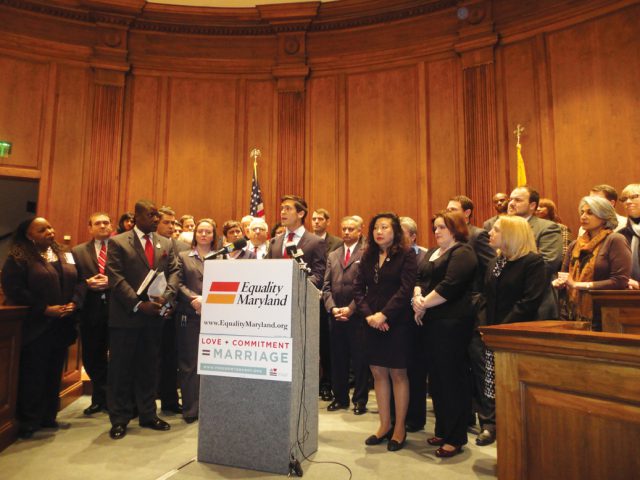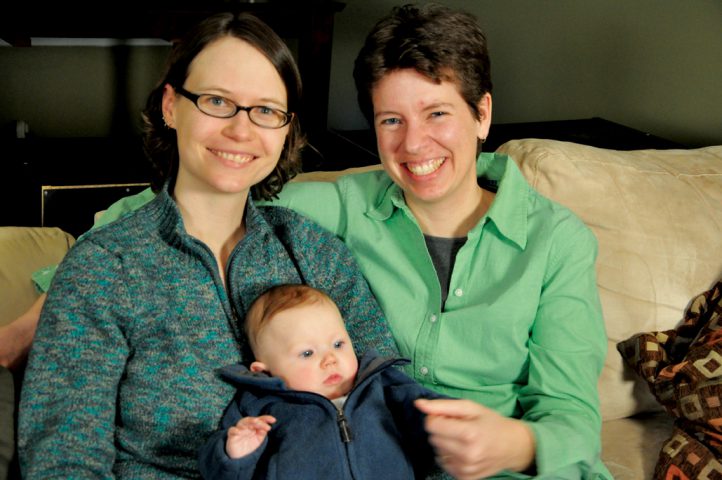Rollercoasters can be exhilarating, but they can also be a dizzying ride of steep curves and sharp turns, jolting passengers around every bend, never letting on what tricks are to come. The quest for marriage equality isn’t much different. While our successes are as thrilling as the euphoria one feels after a good coaster, there’s always the potential that one proverbial kid will barf up a corn dog.
The good news: we’ve made progress—lots of it. The bad news: the ride is nowhere near over. It’s been an up-and-down process for more than a decade.
Equality in the States
Currently in the United States, same-sex couples can obtain a civil marriage license in Massachusetts, Vermont, New Hampshire, Connecticut, Iowa and the District of Columbia. Some of these states are facing appeals and challenges to keep this status.
Massachusetts was first to pass equal marriage in 2004. In July 2010, marriage equality advocates prevailed in two cases in which federal benefits were being denied to legally married same-sex couples. Judge Joseph Tauro of the U.S. District Court in Boston sided with equality in each instance.
Connecticut likewise followed the legislative route to authorizing same-sex marriage in 2008. The state passed a law phasing out civil unions, which had been legal since 2005. All civil unions in Connecticut have been converted to marriages.
New Hampshire followed suit with its New England neighbors, passing a law specifically authorizing same-sex marriage in 2009. The law took effect January 1, 2010, and since then, thousands of couples have married in that state. But our gain is not exactly solid in the Granite State. In the last election cycle, voters put a Republican veto-proof majority in the legislature. New Hampshire now has bills filed in both houses to repeal marriage equality. Gov. John Lynch, however, has promised a veto if they land on his desk.
In Iowa, same-sex couples acquired the right to marry through litigation. The Iowa legislature had passed a Defense of Marriage statute, a common type of law defining marriage as the union of one man and one woman. This statute was challenged in court, and in 2009, the Iowa Supreme Court struck the law down as unconstitutional—affirming the legality of same-sex marriage. But three of the justices that were part of this ruling were voted out in the November elections and there is an attempt to oust the remaining four judges. On February 1, 2011, members of the Iowa House debated a bill that would call a voter referendum on a constitutional amendment banning same-sex marriage. Though pro-referendum Republicans hold a 60-40 majority, Senate Majority Leader Mike Gronstal, a Democrat, has vowed to block it from coming to a vote.
Vermont, the first state to give civil unions a try (in 2000), achieved marriage equality by tug-of-war, with equality ultimately winning in 2009. In a historic moment, the Vermont legislature overturned a veto from Republican Gov. Jim Douglas and legalized same-sex marriage. Vermont was the first state to permit same-sex marriages through a democratically elected legislature, as opposed to Massachusetts, Connecticut and Iowa, where courts ruled it unconstitutional to ban the practice.
Washington, D.C. legalized marriage equality in December 2009, when then-Mayor Adrian Fenty signed a bill passed by the D.C. Council. Following the signing, the measure entered a mandatory congressional review. Marriage licenses became available in March 2010. The District became the only jurisdiction in the United States south of the Mason-Dixon Line to allow same-sex couples to marry.
States that do not recognize same-sex marriage but authorize domestic partnerships or civil unions include California, Oregon, Illinois, New Jersey, Nevada, Washington, Hawaii, Maine and Wisconsin. New Jersey’s civil union law remains in place after a vote (mandated by court decision) on marriage equality failed. The state’s marriage activists have now gone back to the courts for equality.
In Illinois, Governor Pat Quinn signed the “Religious Freedom Protection and Civil Unions Act” on January 31, 2011, which legalized civil unions in the state and goes into effect June 1, 2011.
Also in January, state Senators in Hawaii approved a civil unions bill by a vote of 19 to six, and the House passed it in early February. It now heads to Governor Neil Abercrombie, a Democrat, has said he will sign it into law.
The Illinois and New Jersey laws are closest to offering the same benefits as those of civil marriage, whereas the states with domestic partnership laws provide only a fraction of the benefits afforded to married couples.
Three states without equal marriage laws of their own explicitly recognize same-sex marriages performed elsewhere—Rhode Island, New York and Maryland. New Mexico is the latest state attempting to join this group.
The Next Battlegrounds: Maryland, New York, Rhode Island
Keep an eye on the Maryland General Assembly, where Senate Majority Leader Robert J. Garagiola, a Democrat, introduced the “Religious Freedom and Civil Marriage Protection Act” this past January. The bill, co-sponsored by Democratic House Majority Leader Kumar P. Barve, removes a clause in the current law that limits marriage to heterosexual couples. (Back in February 2010, Attorney General Doug Gansler issued a memo that encouraged Maryland to recognize out-of-state same-sex marriages as equal to heterosexual marriages.)
Sean Eldridge, political director of the nationwide marriage equality group Freedom to Marry, spoke out in favor of the bill’s passage in the Free State. “Gay and lesbian couples want to get married for the same reasons as everyone else,” he said. “Same-sex couples are now free to marry in five states and next door in the District of Columbia, as well as a dozen countries worldwide. And in each of these places, the sky has not fallen, and families have been helped, with no one hurt.”
One of those couples, Heather Moyer and Amy Sens, wanted to get married where they live in Baltimore—but decided to make it legal in Washington, D.C. last summer because they were going to have a baby. Moyer, a media writer for the Sierra Club, wanted to be certain she’d be on daughter Anne’s birth certificate, a right that comes with her marriage to Sens, an ordained minister in the United Church of Christ.
“Marriage means, to us, love, commitment, faith and family,” Moyer told GO. “It’s important to Amy and me; it’s why we had a religious ceremony before friends and family in Massachusetts in 2002, before it became legal there. And it’s why we got married again last July in D.C.
“So, while legalizing marriage in Maryland wouldn’t mean that Amy and I would go get married [again], it would be such a great example of Maryland leading the way in being a progressive state, a state where equality does matter,” she added.
The next hurdle for Maryland’s marriage equality bill is a Senate Committee hearing, where a majority of Senators support the measure. In a General Assembly dominated by Democrats, LGBT advocates expect the bill to pass with ease. Governor Martin O’Malley has said he’d sign the bill when it reaches his desk.
Meanwhile, chances for legalizing same-sex marriage in New York are less certain. While marriage equality legislation has already passed in the New York State Assembly three times and Governor Andrew Cuomo has stated his support in passing it this year, the hurdle rests solely in the state Senate. Its vote in December 2009 was eight votes short of passage; not a single Republican senator supported the measure. The last election cycle has seated a Republican majority in the state Senate, making life more challenging for marriage-minded New Yorkers.
A January 27, 2011 Quinnipiac poll indicated the highest level of support for legalizing same-sex marriage in New York: 56 percent in favor, with 37 percent opposed. Senate Majority Leader Dean Skelos has publicly stated his willingness to discuss marriage equality and the possibility of a vote with his conference. A coalition of LGBT advocacy groups are working to bring this bill to a vote once again in 2011, beginning with Marriage Equality NY’s annual education day on February 8, when marriage equality activists and supporters traveled to Albany to begin educating state senators on the issue.
“Polls consistently show that allowing same-sex couples to legally marry has majority support in New York State,” said Ross D. Levi, executive director of the statewide LGBT rights group Empire State Pride Agenda. “We look forward to the governor and the legislature working together to carry out the will of the people and pass this legislation, so loving same-sex couples in New York can finally protect each other and their children just like any other family.”
In January 2011, lawmakers introduced a new bill to legalize same-sex marriage in Rhode Island, where it has the support of Independent Governor Lincoln Chafee. Opposition has promised to bring legislation that would take the decision out of the hands of the state’s 113 legislators by requiring a public referendum—which is exactly what abolished marriage equality in Maine in 2009.
The Latest from California
California’s trajectory toward marriage equality can best be described as twisted. This quest has taken the national stage, with the potential to decide the issue for the entire country. In May 2008, the California Supreme Court declared the state laws limiting marriage solely to heterosexual couples unconstitutional, and from June 15, 2008, to November 4, 2008, same-sex couples could and did marry in California. But then came Proposition 8, a state constitutional amendment ballot measure that narrowly passed with a 52 percent majority vote. Marriages immediately ceased, though those that took place within the legal timeframe remain valid.
Hours after the California Supreme Court upheld Prop 8, the American Foundation for Equal Rights filed a lawsuit in the U.S. District Court for the Northern District of California challenging the validity of Prop 8 under the U.S. Constitution (Perry v. Schwarzenegger).
Theodore Olson and David Boies, lawyers from opposite ends of the political spectrum who had opposed each other in Bush v. Gore, came together to argue the principle of equality and fairness for same-sex couples. Then-Governor Schwarzenegger and former Attorney General (now Governor) Jerry Brown were sued in their official capacity but did not defend Prop 8. Judge Vaughn R. Walker ordered a full trial and heard evidence on the harms of denying same-sex couples the right to marry, as well as the positive benefits of the right to marry for LGBT families. In August 2010, Judge Walker ruled that Proposition 8 was unconstitutional and violated both the Due Process and Equal Protection clauses of the U.S. Constitution. But he imposed a stay on same-sex marriage to allow for an appeal. The 9th Circuit Court of Appeals continued the motion to stay, but ordered expedited briefing on the merits of the appeal; oral arguments were heard in December 2010.
Recently, the Court of Appeals questioned the California Supreme Court on whether the private proponents of Prop 8 had standing to appeal the federal trial court decision, since the State of California did not appeal. This question has broad implications for the California ballot initiative process and therefore, legal experts predict the response to this procedural question will take at least six months.
If the California Supreme Court finds that private proponents do not have standing to appeal Judge Walker’s decision, the Court of Appeals will likely decide that the appeal is moot and the U.S. Supreme Court would likely not hear a further appeal—resulting in Prop 8 being removed from California. If the private proponents are found to have standing to appeal Judge Walker’s decision, then likely in 2012 the Court of Appeals would either affirm or overrule Judge Walker’s decision that Prop 8 is unconstitutional.
In either scenario, the Prop 8 case would most likely advance to the U.S. Supreme Court. The Court could then affirm Judge Walker’s ruling—in which case, all remaining states with laws banning same-sex couples from getting married would probably be overturned. Alternately, if Judge Walker’s decision was not affirmed, then same-sex couples would be faced with securing their right to marry through their state legislatures or ballot boxes, and continuing to live under a patchwork quilt of legal systems in states that do or do not recognize their marriages.
From the State to Federal Level
The state-by-state approach to marriage equality is a long and twisted coaster ride. There are aggressive court cases and initiatives making their way toward the federal level. Success in any of these cases would result in overturning all state laws banning civil marriage rights for all families and make equality, at least where it relates to marriage, a national reality.
New Yorker Edie Windsor is bringing one such case. In 2009, Windsor lost her soul mate of 43 years, Thea Spire, after she suffered a long-term illness. She and Windsor were legally married in Canada, and resided in New York, which recognizes out-of-state same-sex marriages. Yet, Windsor was forced to pay $350,000 in estate taxes because the Defense of Marriage Act prohibits the IRS, a federal agency, from considering them married. Heterosexual married couples are exempt from such penalties.
With representation by the American Civil Liberties Union, the New York Civil Liberties Union and the law firm of Paul, Weiss, Rifkind, Wharton & Garrison LLP, Windsor is challenging the constitutionality of the Defense of Marriage Act and seeking a refund of the estate tax she was forced to pay upon the death of her wife. Windsor alleges that DOMA violates the equal protection principles of the U.S. Constitution because it recognizes existing marriages of heterosexual couples, but not of same-sex couples, despite the fact that New York State treats all marriages the same.
As the ride continues, it is imperative that as many people as possible get on board in the quest for equality. It’s not an issue of whether or not you want to marry, but whether or not you are respected enough as a human being to have the choice.
Cathy Marino-Thomas is the Board President of Marriage Equality NY. For this article, she collaborated with Michael Sabatino, marriage activist; Molly McKay, Media Director of Marriage Equality USA; and Jeff Friedman, Board President of MENY PAC.






What Do You Think?